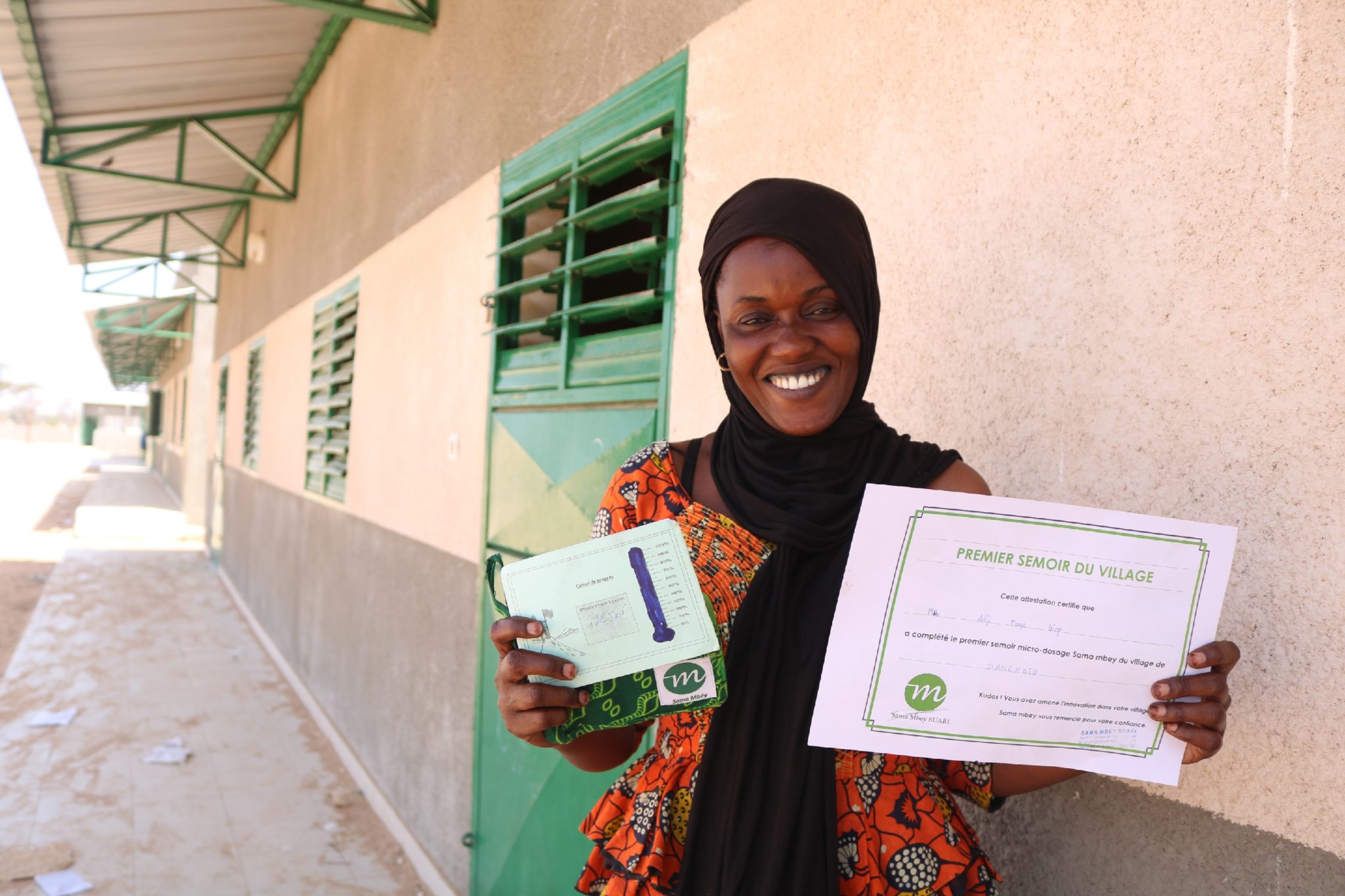myAgro has a diverse client base. Whether a farmer has a quarter hectare of land or nine hectares, whether they are male or female, younger or older, what unites them is their interest in our mobile layaway platform that allows them to access high-quality inputs using their own funds. myAgro recognizes that their financial situations differ, and that their reasons for taking part in the program differ as well. myAgro tailors its program to meet the needs of all farmers, lifting entire communities out of poverty as a result.
Abdji, a myAgro farmer in Senegal, has planted with myAgro for two years now. Single and with no children, Abdji works hard to support herself and was able to start three businesses using her profits from myAgro.
“After my large peanut harvest with myAgro last year, I earned enough income to buy a fridge that I use to sell ice and juice,” she says.
Many farmers join myAgro with the goal of growing enough to feed their families year-round. Abdji, however, has big dreams that go beyond food security.
“I want to increase my production and become a large-scale farmer,” she says. “I also want to continue growing my businesses.”
This year, Abdji used her profits to pay for a myAgro precision planter, and was in fact the first person in her village to purchase one. The benefits she has seen from myAgro include starting her businesses and having access to a precision planter, which put her on the path to fulfilling her dreams.

Abdji holds up her certificate for being the first in her village to complete payments for a precision planter.
Alpha, 17, is a myAgro farmer in the Toubatoul district who decided to spend his summers farming in order to pay off his school fees.
“The layaway system inspires me because, as a student, I can pay for my packages without worry,” he says. “Last year, I was able to sell my harvest to pay for my school fees. This year, since I doubled my land size, I got double the amount of peanuts. I plan on selling some peanuts for cash to pay for school materials.”

Alpha stands in front of his peanut field, which he spends his summers farming.
In addition to offering an affordable system for young people to take part in agriculture, myAgro also meets the needs of large-scale farmers who simply want to learn modern and improved farming techniques. Large-scale farmers are an important part of the myAgro program because they plant more land and increase the total amount of land planted with myAgro. On average, large-scale farmers invest in packages of 312 USD, often including a precision planter, while the average myAgro farmer invests in a package of 35 USD.
One such large-scale farmer is Bjibril, a farmer in Mali with seventeen hectares total who has been farming his whole life. After farming with myAgro and increasing his harvests, he realized the benefits of the new planting methods.
“I planted maize with myAgro last year and got a very big harvest,” he says, “next year, I’m going to buy a bigger package. By taking part in the agricultural trainings, I learned how to plant to really have a good harvest.”

Djibril stands in front of his maize field with an agricultural award he won in 1998.
Not only does myAgro allow all types of farmers to join the program, but it tailors its sales strategies to individual farmers in order to maximize their benefits. In Mali, for example, myAgro sought to increase the sales of sorghum packages, since sorghum is highly nutritious, drought-resistant, and helps women, who make up more than 60% of our client base, to diversify their crops as it can be planted later in the season. After conducting farmer surveys, myAgro’s field operations team developed a new sales strategy focused on the mother and child connection to sorghum, since sorghum is what most mothers feed their children every morning. The team organized cooking classes under a tree for women to learn how to make nutritious porridge using sorghum powder, and gave farmers powder samples when they purchased scratch cards. After implementing this sales strategy, myAgro saw a 10% increase in sorghum sales in just one week compared to the control group, pushing sorghum sales above the 1,000-farmer target.

Maimouna, above, is a farmer and mother of ten in Sikasso, Mali who enrolled for a package of sorghum with myAgro. She decided to enroll for sorghum due to its durability, in addition to its taste.
“Sorghum is better tasting and lasts longer than maize,” she explains, “In the past, insects often destroyed my maize seeds, which is why I stopped growing it. I saw my son’s impressive sorghum fields grown with myAgro and decided to enroll. I plan on using the harvest to feed my family.”
“myAgro is unique in that our field team and our farmers work closely together,” says Victoria, Senior Program Associate in Senegal. “Because of this we’re able to get farmer input when designing our program from a wide variety of the farmers we serve. We know, for example, that men and women are motivated to make payments differently, so we adapt our sales strategies based on those differences, enabling more farmers to complete their packages. It really works.”
The result? myAgro’s impact goes beyond individual farmers. By working with a diverse client base, from women looking to start businesses to young people looking to pay their school fees, myAgro reaches entire communities and lifts everyone out of poverty. In myAgro villages, children go to school, businesses thrive, and people come together with the goal of improving their livelihoods in an empowering way.
“myAgro not only helps my family, but my community,” explains Souleymane, myAgro farmer in Senegal, “myAgro gives jobs to people and diminishes unemployment. By supporting agriculture, myAgro facilitates the development of my country as a whole.”